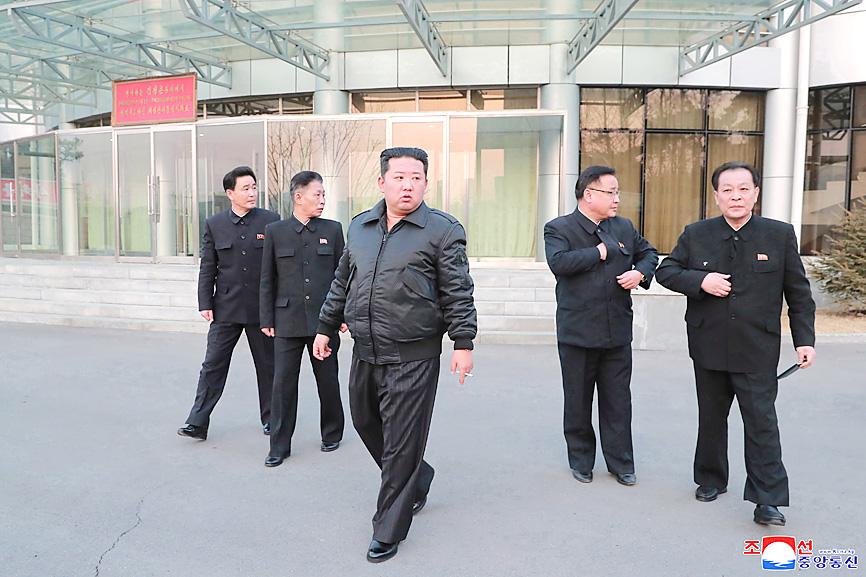The US Department of the Treasury on Friday announced new sanctions after North Korea tested parts of its biggest intercontinental ballistic missile (ICBM) in two recent launches, a sign it is likely to fire the weapon soon to put a spy satellite into orbit in what would be its most significant provocation in years.
The department cited a ballistic missile launch on Friday last week in unveiling restrictions against three Russian-based entities that aided ongoing development of North Korea’s military capabilities. The companies are Apollon, Zeel-M and RK Briz; two people tied to those companies would also be sanctioned.
The sanctions block access to any US assets held by the companies, as well as Apollon director Aleksandr Andreyevich Gayevoy and Zeel-M director Aleksandr Aleksandrovich Chasovnikov, who also controls RK Briz.

Photo: EPA-EFE
Separately, the South Korean Ministry of National Defense said it detected signs that North Korea was possibly restoring some of the tunnels at its nuclear testing ground, which were detonated in May 2018, weeks ahead of leader Kim Jong-un’s first summit with then-US president Donald Trump.
The ministry did not say whether it believes North Korea was restoring the site to resume tests of nuclear explosives.
In 2018, North Korea unilaterally suspended long-range and nuclear tests before it entered denuclearization talks with the US. The talks collapsed in 2019 due to disputes over US-led sanctions, and top North Korean officials recently hinted at lifting the weapons test moratorium.
Seoul’s statement about the nuclear testing ground came after recent commercial satellite images showed a possible resumption of construction activity at the site in the northeastern town of Punggye-ri. It was used for North Korea’s sixth and last nuclear test in 2017.
Analysts who studied the satellite images say it is unclear how long it would take for North Korea to restore the site for nuclear detonations.
North Korea’s neighbors detected two ballistic launches last week. Pyongyang later said it was testing cameras and other systems to be installed on a spy satellite, but did not disclose what missiles or rockets it used.
After analyzing the launches, the US and South Korean militaries concluded they involved an ICBM system under development that North Korea first unveiled during a military parade in October 2020.
The ICBM in focus is the Hwasong-17, North Korea’s biggest missile, which could potentially fly up to 15,000km, far enough to strike anywhere in the US and beyond. The 25m missile, which was shown again at a defense exhibition in Pyongyang last year, has yet to be test-launched.
Kwon Yong-soo, a former professor at Korea National Defense University in South Korea, said the estimated thrust of the Hwasong-17 suggests it is powerful enough to place multiple reconnaissance satellites into orbit in a single launch.
The liquid-fueled Hwasong-17 might be too big and lack mobility given North Korea’s poor road conditions, he said.
The launch could be a show of force, but a spy satellite could sharply increase North Korea’s capability to monitor the movements of US aircraft carriers and other strategic assets, Kwon added.

PRECARIOUS RELATIONS: Commentators in Saudi Arabia accuse the UAE of growing too bold, backing forces at odds with Saudi interests in various conflicts A Saudi Arabian media campaign targeting the United Arab Emirates (UAE) has deepened the Gulf’s worst row in years, stoking fears of a damaging fall-out in the financial heart of the Middle East. Fiery accusations of rights abuses and betrayal have circulated for weeks in state-run and social media after a brief conflict in Yemen, where Saudi airstrikes quelled an offensive by UAE-backed separatists. The United Arab Emirates is “investing in chaos and supporting secessionists” from Libya to Yemen and the Horn of Africa, Saudi Arabia’s al-Ekhbariya TV charged in a report this week. Such invective has been unheard of

‘TERRORIST ATTACK’: The convoy of Brigadier General Hamdi Shukri resulted in the ‘martyrdom of five of our armed forces,’ the Presidential Leadership Council said A blast targeting the convoy of a Saudi Arabian-backed armed group killed five in Yemen’s southern city of Aden and injured the commander of the government-allied unit, officials said on Wednesday. “The treacherous terrorist attack targeting the convoy of Brigadier General Hamdi Shukri, commander of the Second Giants Brigade, resulted in the martyrdom of five of our armed forces heroes and the injury of three others,” Yemen’s Saudi Arabia-backed Presidential Leadership Council said in a statement published by Yemeni news agency Saba. A security source told reporters that a car bomb on the side of the road in the Ja’awla area in

US President Donald Trump on Saturday warned Canada that if it concludes a trade deal with China, he would impose a 100 percent tariff on all goods coming over the border. Relations between the US and its northern neighbor have been rocky since Trump returned to the White House a year ago, with spats over trade and Canadian Prime Minister Mark Carney decrying a “rupture” in the US-led global order. During a visit to Beijing earlier this month, Carney hailed a “new strategic partnership” with China that resulted in a “preliminary, but landmark trade agreement” to reduce tariffs — but

SCAM CLAMPDOWN: About 130 South Korean scam suspects have been sent home since October last year, and 60 more are still waiting for repatriation Dozens of South Koreans allegedly involved in online scams in Cambodia were yesterday returned to South Korea to face investigations in what was the largest group repatriation of Korean criminal suspects from abroad. The 73 South Korean suspects allegedly scammed fellow Koreans out of 48.6 billion won (US$33 million), South Korea said. Upon arrival in South Korea’s Incheon International Airport aboard a chartered plane, the suspects — 65 men and eight women — were sent to police stations. Local TV footage showed the suspects, in handcuffs and wearing masks, being escorted by police officers and boarding buses. They were among about 260 South